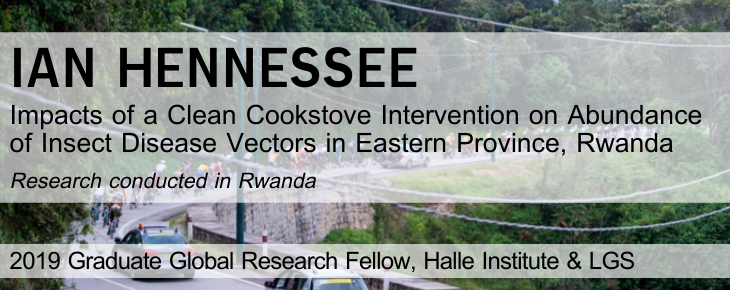
Ian Hennessee, 2019 Global Research Scholar
Research Project: Impacts of a Clean Cookstove Intervention on Abundance of Insect Disease Vectors in Eastern Province, Rwanda
Research Location: Rwanda
Majors: Environmental Health Sciences
|
I was fortunate to receive a Halle Global Research Fellowship grant to conduct research in Rwanda this summer. My research focuses on the impact of traditional and clean cooking fuels on vector-borne disease risk. Specifically, we are investigating whether a switch from smoky biomass fuels such as wood or charcoal to cleaner burning gas fuel could impact mosquito behavior and biting, which could influence transmission of malaria and other diseases that are transmitted by mosquitoes. Globally, cleaner burning fuels are heavily promoted as a way to reduce the nearly four million premature deaths caused by indoor air pollution each year. Towards this aim, Emory is collaborating with numerous other institutions on a multi-country randomized controlled trial to study health outcomes from switching from traditional biomass fuels to clean burning liquid petroleum gas stoves. We hope to see dramatic reductions in pneumonia and other respiratory disease, cardiovascular disease, and pre-term birth. However, there is some concern that reductions in smoke, which is a traditional insect repellent, could actually alter mosquito or fly behavior and increase exposure to disease carrying insect vectors. Indeed, one cookstove study in Malawi actually saw an increase in malaria among children in the intervention arm who received a clean cookstove. With support from the Halle Institute for Global Research, I set out to investigate this possibility in Rwanda this summer. There I worked closely with the head entomologist for the Rwanda Biomedical Center as well as entomology officers and technicians to design a controlled experimental study in six experimental houses in southern Rwanda. Our plan was to cook with gas, charcoal, and wood in the experimental houses and measure the impacts of cooking fuels on household entry, biting, and exiting behavior of one of the most common malaria vectors, Anopheles gambiae mosquitoes. As with all research projects, we had our share of setbacks in the beginning! It turned out that the standardized houses didn’t have the type of directional window exit and entry traps we needed to measure mosquito entry and exiting. So we searched through the literature until we found some suitable designs, sketched out our ideas, and hired a team of local welders and tailors to build the traps! Once our traps were finished we worked day and night to mount them on the experimental houses and get everything ready for the study. We also set to work training a team of local community members on the methods for the study. One of the most rewarding parts of this research experience was working with my Rwandan colleagues. They never failed to impress me: from their expertise in entomology, to their amazing talent for training, to their willingness to go with the flow when we were up all night mounting traps on the huts. We had a blast being together, swapping stories, cracking jokes and working hard all at once. Since being back in Atlanta, I’ve been continuing to support the study remotely, and just a couple days ago we wrapped up our final day of data collection. In October I will return to Rwanda to start the community phase of the study where we will conduct entomological sampling in 240 houses that are part of the cookstove trial. Stay tuned for the results! |
